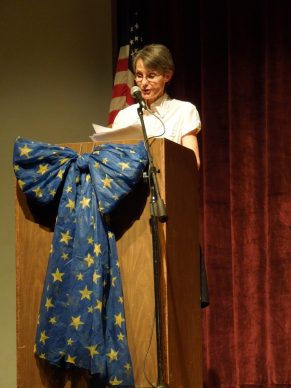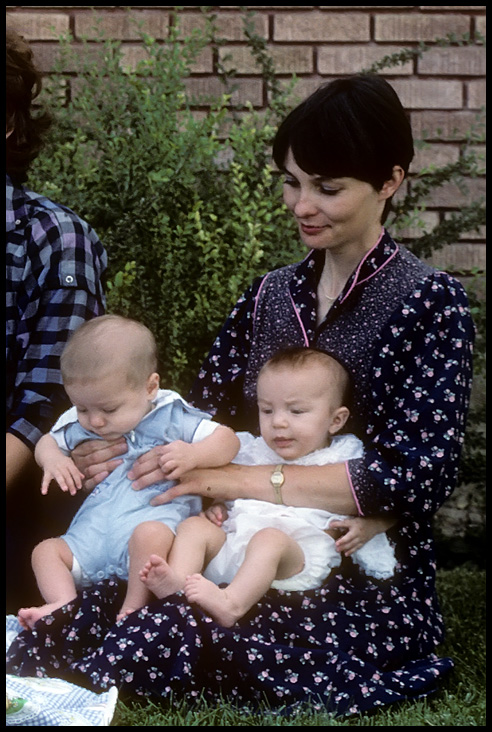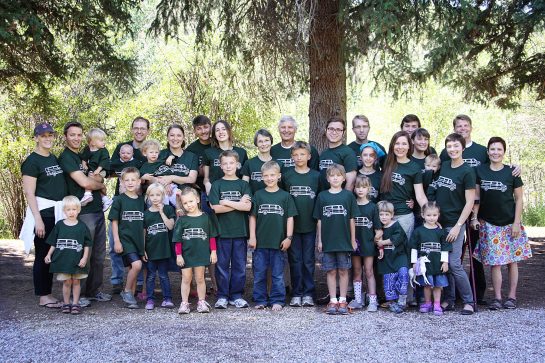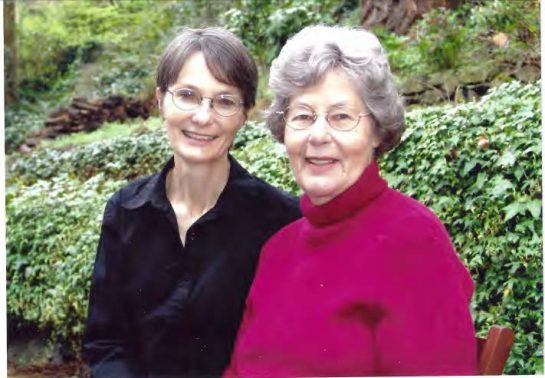Christie Frandsen feasts on the scriptures. And she has taught eleven children and the two hundred missionaries that have gone through her seminary and institute classes to do the same. In this interview, Christie talks about how she studied the scriptures formally and on her own, how she taught others to love them too, and why it is important to her that we not only see the scriptures as a “quote book” but rather understand their whole impact.
You have a deep relationship with the scriptures. How did you begin your relationship with the scriptures? What got you going?
Well, I grew up on Indian Reservations. Very remote. The whole branch was basically my family. When I was in sixth grade, my mother was an early morning seminary teacher. Even though I was only in sixth grade there were not very many students in the class so she asked me if I wanted to come to seminary. I loved that I had the opportunity for my mother to be my teacher. It was Book of Mormon that first year and I remember on several occasions really being moved by what my mother was teaching me. I don’t know if it would have happened the same way if it hadn’t been my mother. I think because it was my mother I saw her in a new light. Having the Book of Mormon opened up to me by her was a really moving experience.
I stuttered very badly when I was young and there was one passage in particular that she was the first to show me in Ether 20:12. “I will make weak things become strong” and people will mock you but “fools mock and they shall morn.” That passage was probably the first verse of scripture that I really felt it was the voice of the Lord speaking directly to me. And that helped me, gave me great hope through many, many years of not being able to communicate very well. So that was my first introduction to the power that scriptures can be in my life.
I came to BYU with the plan to major in chemical engineering. I had taken two years of chemistry in high school. I thought, you know, I love chemistry, I’m good at chemistry. So I get to BYU, my first chemistry class and I realize I’m not good at chemistry! I had kind of a rough time, I didn’t have any confidence at all in my academic preparation for BYU. I was very insecure. I got good grades but it was because I worked my head off. I didn’t feel any particular aptitude or direction and I really just floundered. Like, what am I going to major in? Well, I thought, maybe food science? I had a brother-in-law at the time who had said that that was a good field for women. Because you can use that as you raise your family. Thought about that for a little while but that didn’t seem right either.
I came back sophomore year still absolutely clueless as to what I’m going to major in. And that semester I saw a little notice on one of the buildings on BYU campus about a semester abroad to Israel. I don’t even know what caught my eye about this and I especially have no idea why the thought came into my mind that this was something that I could do. And should do. It was absolutely not even in the realm of possibility for my family. It cost a lot of money and it was so exotic. I was just so compelled and just felt a really powerful prompting of the spirit that I needed to do that. I had already missed the first introductory orientation meeting, they were already well into their weekly meetings with the kids that were going to be going. I was a little bit behind the game but I joined in with this and paid for it all myself with all the money I had saved my entire life working at BYU and working summers. And I went.
I didn’t know anybody in the group, was extremely shy and backwards socially. But I went on this semester abroad and had a life transforming experience. It was an incredible experience. Lamar Barrett was our director and we had a man named Keith Meservy who was just this intrepid enterprising adventurer. He got us in places, experiencing things that no other semester abroad had ever, ever done. It was truly the experience and the opportunity of a lifetime that I just happened on to. I met good friends and gained a lot of social confidence during that but especially it was like, this, this is what I love. And this is what I was meant to do: study the scriptures.
Except for religious education, there wasn’t a major in ancient scriptures because it wouldn’t lead you to any profession. BYU didn’t encourage people to major in things that wouldn’t be able to support them later on. So there wasn’t a major but they had something called university studies back then. If you could make your case— you went to a committee and you presented your own plan, you could come up with your own major. So I presented my case and they accepted it so I designed my own major. University Studies, Ancient Scriptures. And I basically took classes from all the professors that I loved, that I wanted to learn from. It was just fantastic. This was the beginning of my junior year.
I had taken several classes from BYU’s top New Testament Scholar at the time. I think he is still teaching there. I hesitate in using his name. Anyway, I was trying to catch up with two years of lost time. So I was taking twenty-one hours, working twenty hours a week at as a student advisor at the college of fine arts, which was a hard job. A responsible job. Then I had met this guy, so I had to decide if there was going to be a possibility of dating. If there was going to be a relationship, then I needed to clear my calendar a little bit so I decided I would drop this class that I was taking from this professor.
I went in to talk to him about everything and I was fully expecting him to say, “Of course, oh my goodness, what in the world were you thinking? Hand me that drop card and I’ll sign it right now,” but he didn’t. He just looked at me and he said, “I want you to think really carefully about this decision.” He said, “We need women in this field and you could contribute something. And I’m not going to sign your drop card. Because you need to think about if you just want to get married, or if you want to really do something with this wonderful gift that you have been given.” He said, “I want you to think about it and if you still decide you want to drop this class, then I will drop this class no questions asked. That would be fine.”
I was just absolutely shocked at his response and really taken aback. I really did some soul searching that night but thankfully, the Lord knowing me, I had just had some very clear inspiration that, Russ, my husband, was the guy I was going to marry. And it was one of the clearest answers that I had ever received to prayer. And so I knew that I really did need to drop this class, so I did. I did not, I’m embarrassed to say, have the courage to go back to him. I went to the department secretary and said, “He said that it was ok if you just would sign this.” So I never saw him again but all of my children (I have eleven kids, nine living) but the last two ended up taking classes from him. And I made sure they went into him and told him that they were my children so he would know that I had done something truly important with my life. I produced these kids.
I left BYU after just three years. My husband was going to Duke Law School and so we searched and found out they had a really good divinity school there. They had all the classes, you know, Greek and Hebrew and all the biblical study classes that I wanted to take. So I took classes at Duke Divinity School. I had overloaded on hours so I had plenty of hours. I didn’t really go very far in that major. I kind of feel like a little bit of a fraud, when people say, “Oh, you studied ancient scriptures.” I barely started studying Hebrew and Greek, it’s not fair at all to say that I am skilled in these academic tools. But I was the first LDS student they ever had at Duke Divinity School, which was a pretty great experience. One of the classes that I took was taught by a Jewish man and it was Jewish response to Christianity. He would, on occasion, want to quote a passage from the New Testament and after the first day of class it was very clear that I knew the New Testament better than anyone else in the class. It was kind of funny because we have more scriptures to learn than anybody else but because of seminary and because of some great New Testament professors at the Y, I really did know the New Testament better. So anytime he needed a passage from the New Testament he would ask me. It was fun.
So I majored in Ancient Scriptures. And then we moved out to California. And my first church callings were Primary, you know because I had all these little children and then I got involved in Young Women. Just the typical female experience in the church. Really wonderful, but nobody really knew I had any kind of great interest or aptitude for scriptures… Until we were having a Relief Society mid-week activity and one of the women in the ward was the mother of my best friend that I met on that semester abroad many, many years before. She knew that I had been to Israel and she knew I had this background in ancient scriptures. So she asked me to teach this class. And that really was the beginning of anybody, even me, knowing that teaching the scriptures was what I was kind of meant to do. And it came from being an active member, accepting church callings— what we all do.
So I taught this class and it became extremely popular and we had to move out of her living room into my living room. Then into the Relief Society room at the church and then in the chapel at the church. There are women that come from Glendora Tuesday mornings to come to this class that I teach. And it is not because I am funny or witty, you know. It’s because I love the scriptures and it is my gift to open up the scriptures and make the scriptures be alive. I do know that. I am very aware of that.
Because of that class I was asked to become the first female Gospel Doctrine teacher in this ward. You know, they had never ever had a women before! There were some patriarchal men who were a little concerned about that, even skeptical. But it was a good experience and then they asked me to be the seminary teacher and I’ve been teaching early morning seminary for sixteen years. And I have been teaching this Relief Society class for nineteen years. Then I found out that they needed volunteer Institute teachers. These institute directors couldn’t offer me a full time position because I still had children at home, but I talked to the institute director at Glendale and they invited me to teach there. And then the institute director at USC invited me to teach there. And then at Occidental College. It really just kind of spread. I would be asked to do firesides or speak at women’s conferences.
So how do you actually study the scriptures yourself?
Most of what I know about the scriptures really came after I started teaching. My professors at BYU ignited the love and the passion and maybe gave me a little bit of insight on how to study the scriptures. So many people ask me how do I do it, how do I learn so much and it was basically just from teaching.
It has been such a tremendous blessing. It was something that I could do very easily while I was raising my children. And I think it blessed their lives, in fact I know it did. They love the scriptures and it is because I love the scriptures and I would share things with them. They would see me studying and I know that was a really great example, especially to my daughters. It is kind of a Mary story. To sit at the feet of Christ, to read the scriptures, to teach the scriptures with authority. My daughters have something to offer and men will be receptive to that.
Let’s talk more about teaching your children. You have eleven children, but when your children were young and you were in the thick of it, how did you manage?
Well, yeah, it is hard. It is really, really hard. The system that we found worked the best was dinnertime when they were eating. I would read the scriptures to them. There were some disadvantages to this, such as they didn’t take turns reading. But actually in the end I think it was a good thing. They heard King James language read with meaning and with understanding. They all love the King James Bible and they could all read very well and they could always from the very beginning read the scriptures really well, really fluently with understanding. I think part of that came because we weren’t passing the book around as we probably would have done.
Would you read a couple verses, pause and ask questions and then continue?
Yup! Absolutely! And we were fairly consistent. We were not one hundred percenters by any means. And then when we had little kids and big kids and that’s hard because the big kids were gone for activities and we would not be able to eat together but that was still something we tried to do. My husband was never really home for that so these kids have the idea that the women, that the mothers are in charge of scripture learning. And that probably would have been the case even if my husband had been home because of my personality and his, I would have probably just been in charge of it anyway.
We had a couple of summers when we had older kids and I felt like I really wanted them to get more than what we were able to do with all the little kids at the dinner table. So I started something that we called the Summer School of the Prophets. And we did that for a couple summers. I tend to think about that as kind of a failure because I didn’t continue with it but my kids remember it as being something very important in their lives.
And what exactly was it?
We would meet with just the big kids. One summer we read and studied the Pearl of Great Price. They would have read a little portion and I would have a little assignment for them and we kind of made it a little bit formal. We had notebooks, you know. And really got into this text. It was a good thing. It ended up really, really wonderful.
When we vacationed we loved to go camping. That’s what we do because we couldn’t afford to go to Hawaii or those things. So one summer, we took the kids on church history tours. One time to the Nauvoo/Missouri thing and one time to Palmyra/Kirkland. So they had real immersion in church history as well. We tried to do that because my husband just loves church history. They are really smart kids, which I love. One of my daughters is an early morning seminary teacher now, and all of them have been just great, wonderful teachers in the church and teachers of their children. All of my grandchildren know the scriptures really well and love them.
Tell me about teaching seminary.
I have been teaching seminary for sixteen years and last summer I thought, “I am going to count out how many missionaries I have sent out from my seminary class.” I have sent out over two hundred missionaries. So I got this big map and I put a little pin in where all of them have served and that was pretty cool thing to see.
That is amazing!
You know, my influence has gone all over the world. I teach the juniors and seniors so I teach the ones that are about to go out. I help them really, really treasure the scriptures and the word of God.
What are your thoughts about the women of the church and their relationships with the scriptures?
I think lowering the age for sister missionaries was huge. Gigantically huge. So many more girls are going to go on missions because at age nineteen they can plan it into their life. At age twenty one, they couldn’t make plans. I’ve seen a real change in the girls in my seminary classes. They are really serious about studying the scriptures and serious about seminary. And then as these girls come back, they are going to be Gospel Doctrine teachers in their student wards, in their young adult wards. They are going to be Relief Society teachers and they are going to be using the scriptures. They are going to be scripture scholars because they have studied them. And that’s going to be wonderful for the women who don’t go on missions. They are going to see their sisters in front of them teaching with great power and authority and knowing and loving those scriptures. That is going to have an impact too. So I think that was maybe the most single most important thing to ever happen to really helping women understand and be serious about studying the scriptures.
There are few women out in the institutes but they are still very few. I know that by teaching at USC I have been able to have an impact on the women students there, helping them to see that these scriptures are for them. I have always had high expectations that all the girls in my seminary class are going to serve missions and that all my Institute students are someday going to teach Gospel Doctrine and Seminary and even Institute! I express that with great confidence, saying things like, “When you teach, this is going to be what you experience,” and “When you are out on your missions….”
I think every women who is invited to speak in Sacrament meeting should take that as a challenge to really study the scriptures. Not just find nice little quotes from General Authorities. I really wish every woman would see herself as a model for her daughters. She should show everybody there just what women can do with the scriptures.
There is a great talk by Spencer W. Kimball, he gave it at a women’s broadcast many years ago. He challenged the sisters to become sister scriptorians. He kind of coined that phrase. That all over the world, all over the church there would be sister scriptorians who would be able teach the doctrines of Christ from the scriptures. That was a real eye opener for me.

One thing that has really distinguished our church and kept us on track is that we know the scriptures. We treasure the scriptures. We do not just teach the philosophies of men, we teach the word of God and we go right back to the direct source of the word of God. And I am a little bit worried about that now. BYU is changing their curriculum. Required classes are not scripture based classes anymore, they are thematically based classes. One of them is the Book of Mormon but it is not the Book of Mormon, it is like the doctrine of Christ in the Book of Mormon. One of them is the doctrine of the family, one of them is the restoration of the Gospel so that is going to include some Doctrine and Covenants but it is not like studying the Doctrine and Covenants as scriptures. And Old Testament is no longer required. And in Sunday school for our youth now, they are just learning doctrines. We are just getting way too much about learning doctrines but divorced from the scriptures.
So the scriptures become like a quote book, a nice little quote book. The only place in the church where children are still learning a volume of scripture as a volume of scripture is seminary. I just am very worried about that. That has been our iron rod, the scriptures, and the word of God. Those scriptures have been miraculously preserved for us and I just worry that we are not just like slipping away, we are running away from that being the foundation of our teaching in the church. But this is the Lord’s church and I’m sure he is going to keep it in mind. So I don’t think I need to worry too much.
But you do need to worry because that is what keeps you diligent. And that keeps you doing what you need to do.
I think so. And I think that just raising that voice of concern is a reminder. Yeah, ideally kids should be taught the scriptures in their home. I think lots of families are really good about reading the Book of Mormon in their home cover to cover on a regular basis with their children, which is wonderful. But we have three other volumes of scriptures too. That is really important.
At A Glance
Location: La Canada, California
Age: 62
Marital Status: Married
Children: 11, 2 deceased
Occupation: Homemaker and volunteer Seminary and Institute teacher
Schools Attended: BYU and Duke Divinity School
Favorite Hymn: It's hard to choose just one! How about "Children of our Heavenly Father"
Interview produced by Miriam Hermansen



